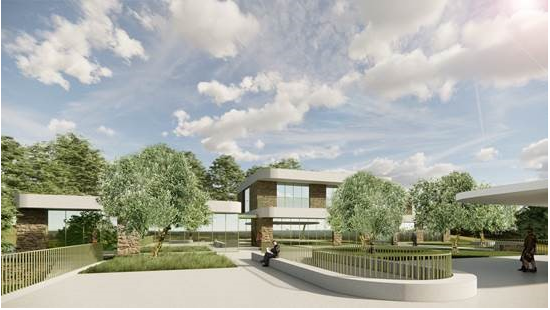In February, the Scientific and Research Centre Koper (SRC Koper) obtained a building permit for the construction of the Centre of Competence for Mediterranean Cultures in Plavje, thus taking an important step towards improving the structure and organisation within the olive industry and providing the much-needed infrastructure.
Since antiquity, the Slovenian Istria and Goriška regions have been renowned for their olive industry, which has been a key factor in the area’s development, both socially and economically. However, the olive industry in Slovenia has long suffered from a lack of adequate infrastructure and systematic support.
Undoubtedly, one of the most pressing problems of Slovenian olive growing is the lack of organisational structure in the sector. The first attempts to bring together expert and scientific staff in the olive sector date back to 1997, when activities began to establish the Experimental Centre for Olive Growing at the Institute of Agriculture and Forestry Nova Gorica. However, the centre has not been able to devote itself fully to research work, which has led to a fragmentation of research activities in the sector.
In order to change this, a number of activities have been undertaken since 2010 within the Institute of Oliveculture – SRC Koper to combine research and professional activities. Unfortunately, however, the creation of a common institution for olive growing in Slovenian Istria has not come to fruition.
Nevertheless, the Institute of Oliveculture – SRC Koper has successfully worked on a number of national and European projects and has built up a reputation in the international arena. The laboratory of the Institute of Oliveculture – SRC Koper has become the only officially designated laboratory for the quality and authenticity of olive oil in Slovenia, has been granted the status of national reference laboratory in this field, and has been included among the accredited laboratories of the International Olive Council.
Aware of the importance of a stable infrastructure for the further development of the olive industry, SRC Koper decided to carry out a project to construct the new Centre of Competence for Mediterranean Cultures in Plavje. In February, the building permit was issued, so SRC Koper can start the public procurement procedures for the drawing up and issue of project documentation for the construction. The investment project, which will take place between 2023 and 2026, will provide adequate premises for the Institute of Oliveculture – SRC Koper, with its laboratory and accredited activities, and will keep research work in this field alive.
“We are delighted that the staff of the Institute of Oliveculture – SRC Koper will finally have the appropriate research infrastructure that their excellent work has long deserved. I would like to thank the Municipality of Koper, which recognised the project as an important driver for the development of Mediterranean agriculture, and the Ministry of Higher Education, Science and Innovation, which also supported the project and placed it on the priority list of urgently needed research infrastructure in Slovenia,” added Prof. Rado Pišot, Director of SRC Koper.
The aims of the investment are manifold, including creating the conditions for continuing and expanding research in the olive and vineyard sector, setting up digital technologies for the sustainable development of Mediterranean agriculture, improving adaptation to climate change, supporting users being introduced to the circular economy, and improving the competitiveness of Mediterranean agriculture. The recently established Institute of Viticulture and Enology – SRC Koper, will also have a space in the new centre.
The investment in the Centre of Competence for Mediterranean Cultures is crucial for the further development and sustainable future of Slovenian olive growing, viticulture and winemaking. In this way, Slovenia will stand alongside the most prestigious European institutions in the olive-growing sphere and contribute to the protection of its agricultural sector and the preservation of the cultural heritage of its regions.
 en
en Slovenščina
Slovenščina Italiano
Italiano